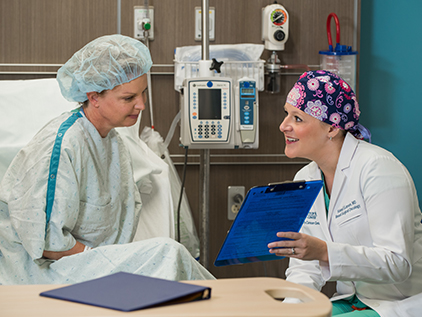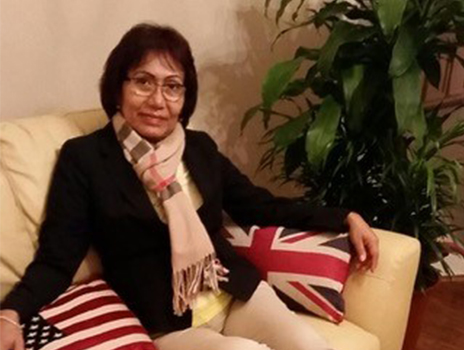- Home
- News Room
- Patient Stories Search Page
- Delia Corahua Breast Cancer Survivor Celebrates 7 Years of Being Cancer Free
August 13, 2019
Delia Corahua, 65, grew up near the Pacific Ocean in Pisco, Peru. Her eyes light up when she talks about the salty scent of the sea air and soothing sounds of waves on the shoreline.
When Delia emigrated to the United States more than 14 years ago, she left behind the ocean and most of her family. She stayed briefly in Tennessee and Missouri, then decided to make Overland Park, Kansas, her home. Delia likes the friendly people and easygoing pace in this part of the country.
In 2010, Delia discovered another advantage to living here: The University of Kansas Cancer Center, 1 of only 71 National Cancer Institute-designated cancer centers in the country.
Self-exam and self-advocacy
At age 58, Delia felt a lump in her left breast and reported it to a physician at a local clinic. He assured her it was nothing to worry about. Several months later, Delia went to another healthcare facility and requested a mammogram and sonogram. Sure enough, her scans revealed a tumor.
“You’re in shock when a doctor says you have cancer. I didn’t know what to do,” Delia remembers. “My sister-in-law told me to get an appointment at The University of Kansas Cancer Center.”
Delia had no idea she lived so close to a nationally recognized cancer center. She followed her sister-in-law’s advice and scheduled an appointment with breast surgical oncologist Carol Connor, MD, (who has since retired). She referred Delia to breast medical oncologist Qamar Khan, MD.
Comprehensive breast cancer care
“A cancer diagnosis is often the most stressful event of a woman’s life,” says Dr. Khan. “That’s why we have nurse navigators, nutritionists, lymphedema specialists and social workers who answer questions, solve problems and manage side effects every step of the way.”
Delia had invasive, estrogen-receptor-positive breast cancer. Dr. Khan started her on chemotherapy to shrink the tumor. Once the tumor size had been reduced, Delia had surgery to remove the lump and several lymph nodes in her arm.
“The doctors and nurses were all so nice,” she says. “They helped me a lot when I was in the hospital.” The clinical team brought in an interpreter during the most challenging part of Delia’s treatment. They wanted to make sure she understood all the details of her care.
After surgery, Delia was technically cancer-free. However, Dr. Khan recommended radiation near the surgery site as an added measure of safety, plus long-term hormone therapy.
“In the past, we prescribed a daily hormone pill like Tamoxifen for just 5 years,” Dr. Khan explains. “But new studies suggest an ongoing risk of breast cancer recurrence up to 20 years after the first diagnosis. So today, we strongly encourage patients to take a daily hormone pill for 10 years. Then, we watch them closely for another 10 years after that.”
Breast cancer survivor smarts
When Delia reflects on her cancer journey, she concedes that 2010 was difficult. “But each year since then, I’ve grown a little better, a little stronger. I take good care of myself,” she says.
Delia encourages everyone to take good care of themselves, “Don’t be scared. Get a mammogram or sonogram. If there’s a problem, go to The University of Kansas Cancer Center," she says. "They have the best doctors. Then pray.”
Once her recovery was complete, Delia couldn’t wait to visit Peru. In summer 2011, she spent 2 weeks in Pisco surrounded by the warm embrace of family. And of course, she reconnected with a very special friend: the ocean.
As with all treatments, individual patient results vary. It is important to discuss your treatment options with your healthcare provider.

Your best option for beating cancer
The Women’s Cancer Center at The University of Kansas Cancer Center focuses on breast and gynecologic cancers, providing specialized care to women.
Together against cancer
In Wyandotte County, almost 29% of the population is Latino. To better serve this growing community, the University of Kansas Medical Center in 2011 established Juntos Center for Advancing Latino Health within the Department of Preventive Medicine and Public Health. The goal of Juntos is to address the specific healthcare needs of the Latino community.
To further reduce health disparities, The University of Kansas Cancer Center partners with the Hispanic Chamber of Commerce of Greater Kansas City. Together, our organizations are sharing the news about the importance of participating in clinical research trials at The University of Kansas Cancer Center.
The diagnostic tools and treatments our physicians use today were developed in clinical trials performed years ago. Thanks to these discoveries, many breast cancer patients like Delia become cancer survivors. New clinical trials happen every day at The University of Kansas Cancer Center. More participation by Latinos today will help create a healthier Latino community for generations to come.
Learn more about our clinical trials.
